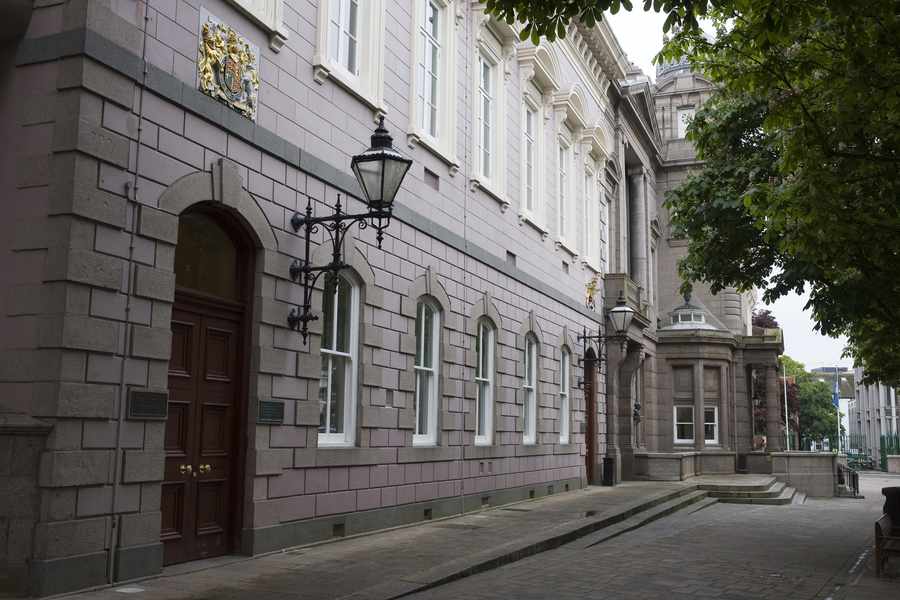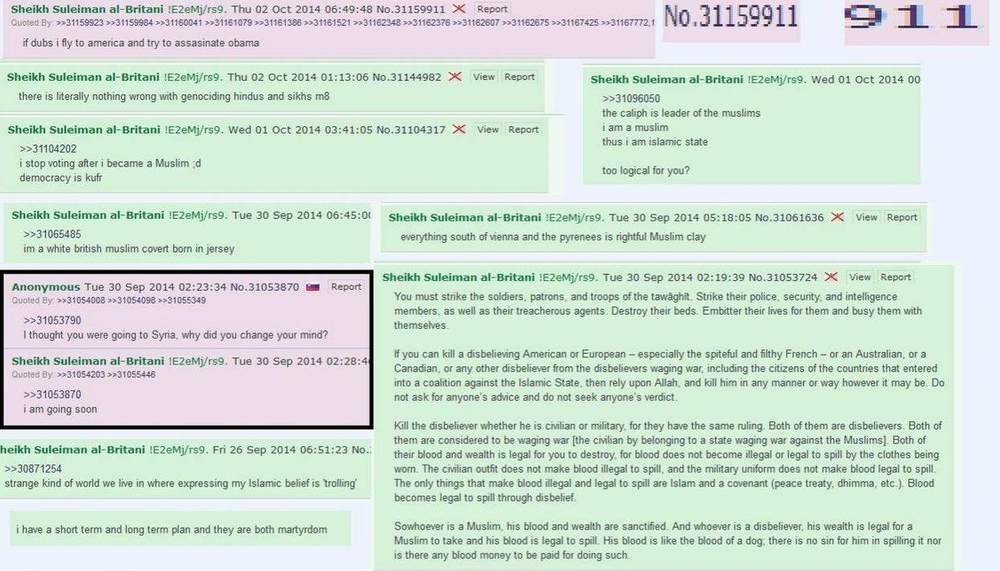Mark Alexander Harding (21) was sentenced to 18 months probation for downloading copies of the terrorist magazines Inspire and Palestine which are created by the global terrorist group formerly headed by Osama bin Laden.
The digital editions contained articles on Jihad – an Islamic struggle against non-believers – as well as detailed instructions on how to make pressure cooker bombs like the one used in the attacks in Boston last year which left three people dead and hundreds injured. He later posted those details online.
- Mark Harding suffers from a type of autism formerly known as Aspergers Syndrome
- As a result he has obsessive tendencies and struggles to understand other’s emotions
- He pleaded guilty to two counts of collecting terrorist material
- He posted 5,000 comments, some supporting the so-called Islamic State, on the internet forum 4Chan – an English-language imageboard website containing hundreds of threads about a variety of subjects
- Police found ‘a large number’ of images and audio material stored in two folders named ‘Islam’ and ‘Nasheed’ on Harding’s computer
- They included beheadings carried out by the so-called Islamic State and a song about IS
- He spent one month living with an Iranian family between 2013 and 2014
- This was first terror-related case Jersey has ever had[/breakout]
The defendant, who appeared in the Royal Court flanked by his parents and wearing light blue jeans and a grey jumper, also posted more than 5,000 comments on the internet forum 4Chan under the guise of Sheikh Suleiman al Britani. Some of his posts expressed support for the so-called Islamic State whose members have been responsible for barbaric beheadings of Westerners.
Specialist detectives from the States police also found images – some extremely graphic depicting beheading carried by the the so-called Islamic State – and audio-clips on the former Victoria College pupil’s computer.
Solicitor-General Howard Sharp, prosecuting, told the court how a year before the police seized the defendants computer he had travelled to Turkey and then Iran where he spent a month living with a local family.
The court heard how after his return Harding saved £10,000 in order to travel back out to Turkey and then onto northern-Iraq. A digitised map plotting his route was found on his computer.
However, Mr Sharp recognised that Harding had not been radicalised and his online persona was a by-product of his autism which caused him to develop obsessions over subjects. He added that his use of the internet forum was evidence of him ‘acting out’ his angers and frustrations.

The exact causes are not known, although it’s thought there’s a genetic predisposition to the condition. Scientists think multiple genes are likely to be responsible, rather than a single gene, and the National Autistic Society says much more research is needed.
Advocate Mike Preston, defending, said despite the ‘henous’ nature of some of the defendants comments online he was not a terrorist.
‘This case is about a young man who is 21 but very young for his age with autism. He has not been radicalised and he does not hold extremist views. The defendent is not a terrorist, he has never been a terrorist and he will never be a terrorist. This case is about autism.’
He added that downloading the magazines was an easy task and something his client did not realise was illegal.
Delivering the court’s sentence, Commissioner Sir Michael Birt said that cases similar to this in the UK in custodial sentences but he added this incident was ‘very different’.
‘It is clear from the report that you suffer from autism and what you did was a form of role play. This is not a case about terrorism this is a case about a 21-year-old who got obsessed with a topic because of his autism.’
Jurats Paul Nicolle and Michael Liston were sitting on the case.
Meanwhile, a Canadian teenager has told how he warned Harding about his behaviour online days before he reported him to MI5.
The 18-year-old, who has asked not to be named, told the JEP that he was worried by some of Harding’s comments made online.
Now the teenager who first reported him to intelligence agencies in Canada and the UK has told how Harding’s online persona had become notorious among users of the site.
‘He was constantly online saying things I found really worrying so I reported him on the off chance that this guy was genuine,’ he said.

In a statement the States police said the case highlighted their reliance on members of the public to report incidents.
‘The sentencing marks the culmination of a complex and protracted enquiry led by the States police’s Special Branch officers in conjunction with the High Tech Crime Unit.
‘The police will continue to investigate and, where appropriate, prosecute those who seek to support or glorify acts of terrorism, wherever that may be.’
During the hearing at the Royal Court on Friday it was accepted that Harding, who had spent a month in Iran and intended to travel back to northern Iraq, had not been radicalised and his online activity was the result of his autism which caused him to develop obsessive tendencies about subjects.




The sentencing of Mark Harding for offences committed under the Prevention of Terrorism (Jersey) Law marks the culmination of a complex and protracted enquiry led by the States of Jersey Police’s Special Branch Officers in conjunction with the High Tech Crime Unit.
Mark Harding pleaded guilty and was convicted of two terrorism offences relating to the ‘posting’ of instructional material on the internet concerning the use and construction of pressure and pipe bombs.
The States of Jersey Police will continue to investigate and where appropriate, prosecute those who seek to support or glorify acts of terrorism, wherever that may be.
This case highlights the great reliance we continue to place on the public to report such activity to us and we would ask people to keep doing that.
In particular and in order to identify and mitigate future similar acts, we will continue to work with all these agencies to promote the “Prevent” strategy. A strategy closely aligned to the UK Contest Strategy and one which seeks to Recognise, Understand and Refer individuals, who may be susceptible to radicalisation, hold extremist views or who have been radicalised and support acts of terrorism.
The Special Branch Ports Office have been delivering this message to a wide variety of States staff for some time now and will continue this in earnest throughout 2015. ‘Prevent’ works best when the whole community is ‘alive’ to these challenges however also when they have the confidence and awareness to report any matters that may be of concern to them.






